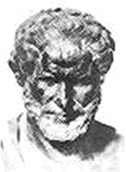Reading on: The consequences of Aristotle's world-view
Editor's summation [230 words]
Everything in nature has its end and function, and nothing is without its purpose.
Everywhere we find evidences of design and rational plan.
God to Aristotle is the first of all substances, the necessary first source of movement who is himself unmoved.
Aristotle argued that the universe is spherical and finite. Spherical, because that is the most perfect shape; finite, because it has a center which is the center of the earth, and a body with a center cannot be infinite.
Matter seems to possess mystical qualities — preferences, aspirations for certain kinds of motion — it is animated. Things fall because it is their desire to return to earth.
Moving matter comes to a stop unless there are unseen agents at work to keep it moving. The crystalline spheres that hold the planets are kept in motion by invisible "intelligences."
The synthesis that Saint Thomas Aquinas forged between Aristotle's ideas and the Christian system was the dominant worldview of the Middle Ages and kept science an exercise in logic rather than the direct observation of nature. The church fathers' refusal to look at the moon through Galileo's telescope and his subsequent difficulties are examples of the hold of Aristotle's worldview.
Aristotle's views, in one form or another,were taken as the starting point for all natural science until the age of Newton. Aspects of St. Thomas' synthesis are still influential in the world-views of some people today.


